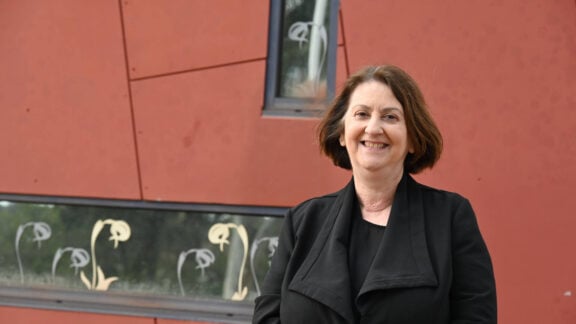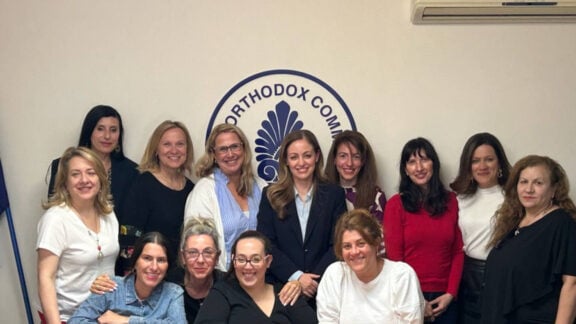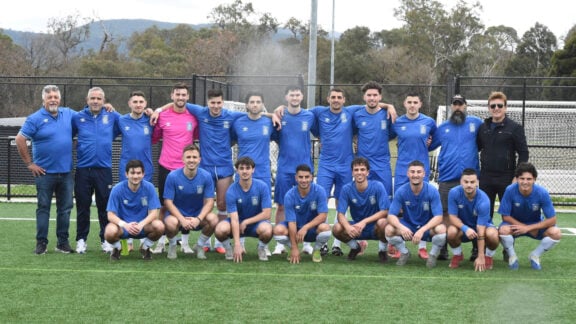Dozens of Greek Australians attended the commemorative event that took place last Friday at the headquarters of the Greek Community of Dandenong honouring the Begona Brides.
Educator Peter M. Photakis was the keynote speaker for the night, narrating his heartfelt story and memories from his arrival to Australia 65 years ago as a young boy, on a vessel carrying 900 young Greek women heading to the Lucky Country as promised Brides of men who were settled here in the hope of a better future for themselves and their families.
The event was attended by five of those Begona Brides who were among the silent protagonists of Mr Photakis’ tear-jerking story, a story many have described as a 20th century Odyssey, Eleni Karanitsou, Trantafyllio Kottaki, Maria Katsiou, Theodora Papazoi and Panorea Patmiou.

Mr Photakis’ speech:
I arrived in Australia on 12 June in (Fremantle) and 16 June in Port Philip Bay Pier (Melbourne) by ship the (Begona) with my mother and two brothers alomngside over 900 young Greek Women in 1957. It took us about one month (27 days) to arrive in Australia, it was not a very pleasant trip for some but we all managed to arrive at our destinations.
For my self and my family, it was very pleasant, because we had a cabin and with all the comforts. The Brides, many of them were down below deck with all the noises and odours, had a journey as long and unpleasant as one can imagine. So many of them used to visit us, and some of them even slept on deck for most of the journey.
As a child of 8 years of age I had many fond memories of the journey with so much happening, and having an inquisitive mind, I was not bored at all, especially at meal times when the ship used to move from side to side and our plates used to move back and forward on the dining tables and we played games with the other children onboard, like who would finish their meals first. The best part was when we were given bowls of soup, most of the soup ended up on the table, on us, and on the floor and we would be told off by the sailors. The most unpleasant part was when we ran out of fresh water and they used seawater and many times we would find seaweed in our cups when we turned on the taps for a drink. The other thing that made me ask many times my mother, was why are there so many young greek women on the ship. She would give me a different answer every time and it didn’t make much sense to me. One thing that I noticed was that some were holding photographs of men. I couldn’t accept my mother’s different answers until one day near the end of journey she said to me that they were Brides (Νύφες), who were married by photograph and that confused me even more. How can someone get married by photograph? Today we call it internet dating. By the time I could get my head around this we had arrived in Australia and I had forgotten all those questions except for the fact of whether I would ever see the Brides and the friends I made on the ship.
For many years I kept asking myself what ever happened to the Brides and where are they now? So, I started to ask many Greek people about their backgrounds and their migration to Australia and I found their stories very interesting and fascinating. The erg was to take my research further, so I started by looking for the passenger list of the ship (Begona), which led me to The Australian Archives. I visited their offices in Melbourne and actually held and read the Log Book in my hands and thus the journey back in time began. During my research, I found and met a few of the Brides through my students -as I am an educator- and had unknowingly become good friends with them as well. Now I would like to take this research further and I would like to help the children and grandchildren of The Brides to case-study their grandmothers (Brides) and eventually have many reunions and write their stories in a book so that each family remembers the journey we all made 65 years ago. Each Bride will have good and bad memories of their Odyssey 65 years ago. Through my research I have found some of the Brides in South Australia have met a few times and even had 40-, 50- and 60-year reunions.
All the Brides had to choose a profession; most chose housewives and some chose dressmakers. The other passengers were listed, as, married, students or children. I was listed as a student and my brothers as children. The few men were listed as farmers. Other information given, was their age and address in Australia. Often, names and addresses were not spelt correctly, but as the passengers remembered them from letters sent to them by future partners, in English.
I would like the project to be very successful because if it doesn’t happen, then all these stories and information will be lost forever and the future generations will never learn about their Greek Heritage. I would also like for all this to be added into the Modern Australian History. As we are aware Australia is very much a multicultural country with many different cultures and languages. As citizens of such a country we must recognise, accept and introduce these findings in the school curriculum for it to be taught as part of Australian Studies. Greeks as migrants are found in every corner of the world and have made great contribution to their adopted countries but never forget their place of birth. The word Diaspora is alive away from our homeland. There are approximate 12 million people living in Greece and about 5 million in the Diaspora, not many ethnicities from other countries have as much passion about their place of birth.
I have a made list of all the passengers and Brides who came to Australia but most of the Brides’ names have change because they got married. I will be making requests through the Community Television CH 31 (Hellenic Presences). Also, I would like to put on a photographic exhibition together with the title ‘Then and Now- Begona 65 years ago’. Moreover, I would like to make a DVD of the Brides now and the stories they might like to share while they are still alive and well. I am sure they will enjoy the project as much as I will. I also have the complete list of the passengers and books of the Migrant Ships with all the history and information of the journeys they made, what happened to them, where they ended up.
I hope that many others who have migrated to Australia have the same passion as me and can collect such information to start a family history folder no matter which country they came from and pass it down to their family members. We owe it to Australia because people like me would not have had the chance to become better humans and get educated in our chosen professions. I love Australia deeply but I love my birthplace even more, I cherish its history and what Hellas has given to the world. I would like to be known as a Greek Australian living in the Greek/Australian Diaspora, someone that has contributed to both countries in the fields of education and history, my chosen area of expertise.









